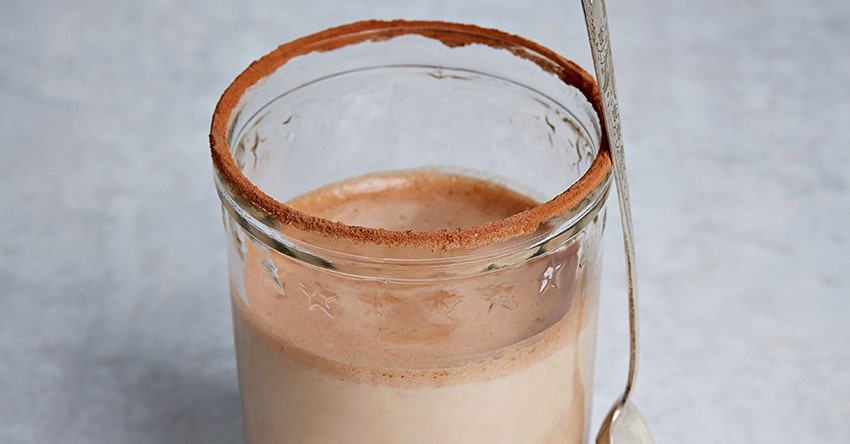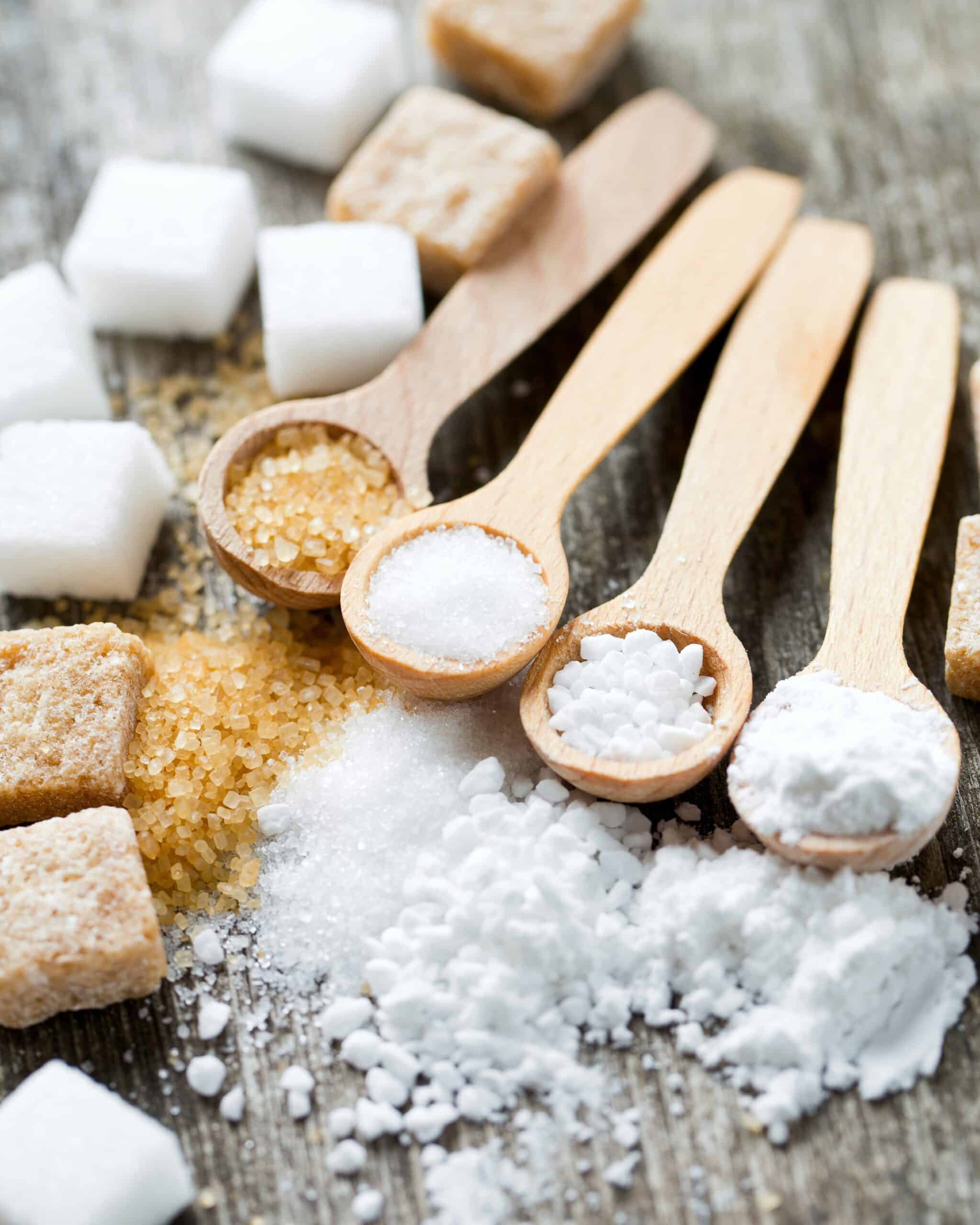Hey Sweetness,
Are you afraid of bananas? I don’t mean literally, of course—but do you avoid higher-sugar fruits because you think they’re “bad” for you? This is something I want to discuss today.
Sugar is tricky. And in general, we should keep our sugar intake low.
Like most things that affect our health, though, it’s more complicated than that. Some health advocates aren’t acknowledging this, and are pushing a more black-and-white approach. I think telling the whole, detailed story is more helpful.
In this blog, I’ll cover my personal sugar story, the nuances of various types of sugar and how to reduce sugar in recipes. I’ll also outline what I believe is a healthy—physically, mentally and emotionally—approach to sugar. At the end of the day, it doesn’t have to be all or nothing and it really comes down to what works for you.
My sugar story
Way back in the day, I used to joke that I had a threesome every night with two guys named Ben and Jerry. In other words, ice cream (and all forms of sugar for that matter) were seriously seductive and addictive to me. I struggled through this rollercoaster relationship for years. Let me paint the painful picture for you: Most nights, I’d open up a fresh pint of ice cream and promise myself I’d have just a bite or two (hello, amnesia!). But then I’d quickly realize that I couldn’t put the spoon down. How did I stop? I’d use my dessert as my ash tray… Except that wasn’t enough—I’d just dig out the cigarette butt and ashes and keep going. Next (desperate) step? I’d spray it all down with cleaning supplies. That would finally stop me. Talk about dysfunction.
I tell you this to illustrate that I fully understand the power sugar can have over us. And as a nation, our sugar consumption has gotten completely out of control. Thankfully I have a new, healthier relationship with sugar now (and I kicked cigarettes to the curb a long time ago, too). I’ll nibble on some fruit or vegan dark chocolate when I want something sweet these days. Sugar isn’t the boss. I am. By changing my diet, resetting my tastebuds and dealing with the emotional stuff (important!), I was able to put sugar in its place. I’d say what helped me ditch the sweet stuff the most, though, was educating myself on all things sugar.
Not all sugar is created equal
One response to the sugar epidemic is to deem all sugars off-limits, but there’s a big difference between natural sugars and added sugars. The reason that government agencies and health experts make a point of discouraging “added sugars” is because these types of sugars are heavily processed and devoid of any natural nutrients. They bring our blood sugar up without supplying our bodies with anything healthful: a lose-lose situation.
Naturally occurring sugars—I’m talking about the sugars in fresh fruits and vegetables—deliver sweetness while also providing vitamins, minerals, antioxidants and concentrated stores of powerhouse phytonutrients.
The sugars in fruit (or sweeter vegetables, like carrots, beets and sweet potatoes) also come packaged with fiber, which helps us feel full and slows the absorption of sugar into our bloodstream. Plus, the micronutrients in fresh fruit may prevent the uptake of sugar in our small intestine. This means that many of us can enjoy the delightful sweetness and health benefits of fresh fruit without experiencing the drawbacks of mood-busting highs and lows and blood sugar spikes.
Not surprisingly, evidence shows that populations who eat more fruit have a lower BMI and lower risk of developing many chronic diseases, including high blood pressure, heart disease, stroke, certain cancers, type II diabetes, digestive diseases and obesity.
A sane approach to sugar
A healthy relationship with sugar is different for everyone. If you have special reason to be vigilant about the amount of sugar in your diet—for example, if you’re a cancer patient, or have diabetes or candida—then you may want to exercise some mindfulness even with naturally occurring sugars. For you, it may be wise to seek out fruits that are lower in sugar, and to use only moderate amounts of fruit and sweet veggies in your green drinks and meals. Avoiding refined and processed sugary treats as much as possible is a no-brainer when facing these challenges.
For those who need to swear off the sweet stuff, don’t despair. It’s possible to create tons of flavor and character in recipes without relying exclusively on sweet ingredients. One of my favorite tricks for brightening the taste of my juices and smoothies is to use fresh herbs, lemon, lime and ginger. Just because your juice or smoothie isn’t sweet, doesn’t mean it should be blah.
But for many people, I advocate finding some middle ground in the sugar struggle. A dogmatic approach of total avoidance—including naturally occurring sugars in produce—can lead to rebellion and bingeing (see: Ben & Jerry’s story). Not to mention all the missed out benefits that come from something as remarkable as a blueberry. Keeping sugar in check should not be about vilifying it or fearing it. It should be about making peace with it, living comfortably with it and understanding how much sugar feels good to each of us as individuals. The aforementioned banana could be a no-no for some, but could be hugely healthful for others. It’s up to each of us to determine how much sugar is right for our bodies and lifestyles.
A low-sugar sweet treat
In addition to fruit and dark chocolate, I love to satisfy my sugar cravings with naturally sweet (and mega-nutritious) smoothie and nut milk recipes. Here’s a super-delicious and superbly healthy nut milk to sip on when you’re jonesin’ for something sweet. It’s from my new book, Crazy Sexy Juice, and I just know you’re going to love it. And by the way, a big thank you to everyone who left a review on Amazon! Your praise means the world to me. It’s why I do what I do. Now on to the recipe…
Chocolate Almond Milk

Yields 3.5-4 cups
- 1 cup almonds, soaked for 8 hours
- 2 to 3 pitted Medjool dates
- 1/4 teaspoon salt
- 4 cups water
- 2 tablespoons cacao powder
- 1/4 teaspoon cinnamon (optional)
1. In a high-speed blender, blend the almonds, dates, salt, and water till totally smooth.
2. Create a large, double layer of cheesecloth and hold it over a large mixing bowl, or hold a nut milk bag over a large mixing bowl. Pour the almond milk through the cheesecloth or bag and squeeze thoroughly. You can compost or discard the nut pulp.
3. Transfer strained almond milk back to your blender. Add the cacao and cinnamon, if using. Blend till smooth.
4. Transfer the nut milk to an airtight container. It will keep in the fridge for about 3 days.
Now I’d love to hear from you: What’s your approach to sugar? OR what’s your biggest sugar hang-up?
Peace & nanas,



I’ve recently begun consuming black cumin seeds. As suggested from some websites I’ve visited in “ways to consume black cumin seeds”, I’ve been mixing equal amounts of ground black seeds with honey. The suggested way to eat this is to have 1-2 teaspoons in the morning, one half hour before eating breakfast. I do try to make an effort to eliminate sugars from my diet (like you and so many other health coaches suggest). I was wondering if this daily intake of honey is suggested, especially on an empty stomach which I’m assuming can cause a spike in insulin levels. Any imput would be great appreciated.
Thank you advance,
Eileen
in the matter of getting used not do eat so much sugar i tell you from my part, that it doesn’t take many days to get used not to put sugar in tea or coffee. one can sense the taste much better without. it’s like a different drink!
as it comes to bananas: i got rather confuesed about what all the experts tell in their Newsletters. the latest thing i heard, was that when we eat the banana in a quite green condition there is not as much sugar in it, but the nutritions for the micobiom is then greatest!
Hi Kris, and thank you for being there. I am a cancer patient and consume no refined sugar and 2 or fewer servings of fruit a day (one raspberries, for the ellagic acid). But high-sugar vegetables? I thought all veggies except corn and potatoes were safe and unlimited. I consume tons of carrots. Can I find a listing or website dealing with this? Thanks, and good health and good luck to all of you.
Hello Kris 🙂 The only problem I’ve got with Cacao powder is that it makes me super hype, it gives me tachycardia and makes me feel super anxious. Is there something I can substitute with? thank you!
Hi kris my name is Bernard I lost my mum to cancer she pancreatic cancer my mum was very fit at get age she was a diabetic I’m cut out sugar I really want to thankyou for being so loving and caring love your friend Bernard
Hi Kris,
I’ve been craving pineapple and bananas since I started chemo. I never ate those before, but now I put them in my protein smoothie every day. Is this too much sugar?